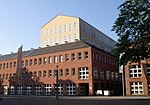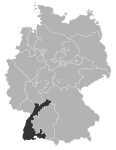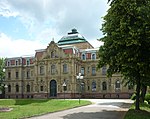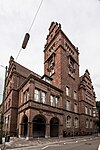State Museum of Natural History Karlsruhe

The State Museum of Natural History Karlsruhe (German: Staatliches Museum für Naturkunde Karlsruhe), abbreviated SMNK, is one of the two state of Baden-Württemberg's natural history museums. Together with the State Museum of Natural History Stuttgart (Staatliches Museum für Naturkunde Stuttgart) it is one of the most important repositories for state-owned natural history collections. It is well known for its exhibitions on all aspects of natural history in the city of Karlsruhe and beyond. Every year, the SMNK is visited by about 150,000 people. Research at the museum mainly deals with various fields of natural history i.e. geology, paleontology, taxonomy, biogeography, and ecology. The SMNK is part of the national networks German Natural History Research Collections (DNFS), the Humboldt-Ring (Association of Research Museums) and of the International Council of Museums (ICOM). The SMNK looks back at a long history as it emerged from the cabinet of natural history of Landgravine Caroline Louise of Hesse-Darmstadt during the mid 18th century.
Excerpt from the Wikipedia article State Museum of Natural History Karlsruhe (License: CC BY-SA 3.0, Authors, Images).State Museum of Natural History Karlsruhe
Erbprinzenstraße, Karlsruhe Innenstadt-West
Geographical coordinates (GPS) Address Nearby Places Show on map
Geographical coordinates (GPS)
| Latitude | Longitude |
|---|---|
| N 49.0073 ° | E 8.4003 ° |
Address
Erbprinzenstraße 13
76133 Karlsruhe, Innenstadt-West
Baden-Württemberg, Germany
Open on Google Maps











